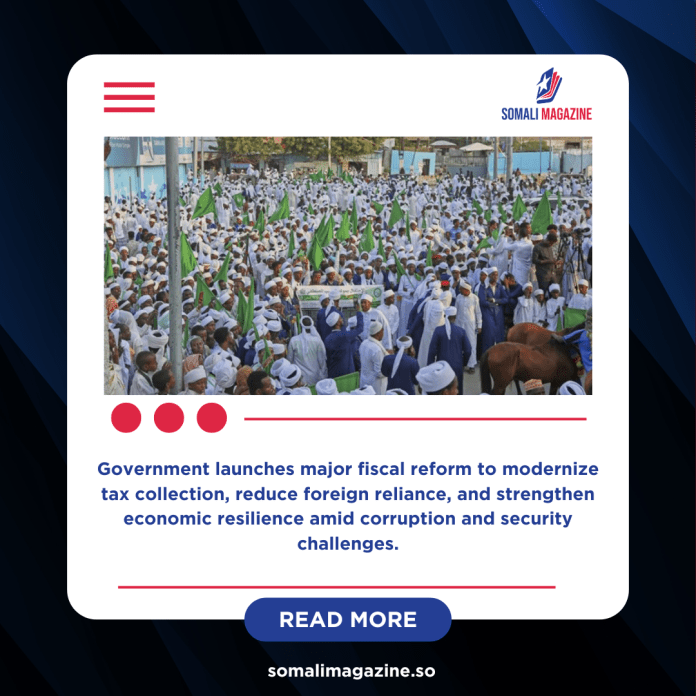Facebook Twitter (X) Instagram Somali Magazine - People's Magazine
Somalia has taken a major step toward strengthening its economy by introducing a new tax law during its annual tax forum in Mogadishu this week. The government says the reform is designed to modernize how taxes are collected, reduce the country’s heavy reliance on foreign aid, and help Somalia become more self-reliant. The forum brought together government officials, business leaders, and representatives from various institutions, offering a platform for open dialogue on how the new system will work.
For years, Somalia has struggled with extremely low tax revenues compared to most countries in Africa. In 2022, the country’s tax-to-GDP ratio stood at just 2.6 percent, one of the lowest in the world, far below the African average of 16 percent. This situation has limited the government’s ability to fund services and invest in infrastructure. A government representative told participants at the forum that the new law will help streamline tax processes and improve collection systems, allowing Somalia to generate more domestic revenue to provide the services its citizens deserve.
The reform is not just a local initiative but also part of Somalia’s commitments under its International Monetary Fund (IMF) program. The IMF has long urged Somalia to broaden its tax base, modernize customs systems, and move away from dependence on the limited revenues collected at Mogadishu’s port and airport. By complying with these reforms, Somalia hopes to strengthen its financial stability and attract more international support.
This tax law comes at a time when Somalia is making progress in rebuilding its economy after years of debt distress. Through the Heavily Indebted Poor Countries initiative, Somalia has managed to reduce its external debt from $5.3 billion in 2018—around 64 percent of its GDP—to less than 6 percent by the end of 2023. This massive debt relief has created space for Somalia to implement meaningful fiscal reforms without the crushing burden of unsustainable debt.
The private sector, which will play a big role in the success of the new law, generally welcomed the reform. Business leaders at the forum said they support the move but stressed the need for transparency, fairness, and predictability in its implementation. They argued that a fair tax system will increase investor confidence and create a more stable environment for businesses to grow. For many in Somalia’s private sector, the hope is that the reform will not only increase government revenue but also improve trust between the state and businesses.
Still, the path forward is not without challenges. Somalia continues to face deep-rooted issues that could undermine progress. Corruption remains a serious concern, with the country ranked 179th out of 180 on Transparency International’s 2024 Corruption Perceptions Index. Insecurity is another major obstacle, particularly in areas controlled by al-Shabab militants. The extremist group runs its own parallel taxation system, collecting millions of dollars every month, which weakens state authority and discourages legitimate businesses.
On top of these governance challenges, Somalia is also grappling with a worsening humanitarian situation. Recurrent droughts and displacement have left more than seven million people in need of aid, while over a million have been forced from their homes since 2021. The government is under pressure to provide relief and basic services, and officials argue that raising domestic revenue is essential for building resilience against such crises.
Despite the challenges, the government remains optimistic. Officials emphasized during the forum that consultations with the private sector will continue as the new law is rolled out. They described the conclusion of the forum as an important milestone in Somalia’s effort to strengthen its financial institutions, build resilience, and lay a solid foundation for long-term economic growth. The new tax law, they said, is not just about collecting more money—it is about creating a more self-reliant Somalia capable of funding its own future.

